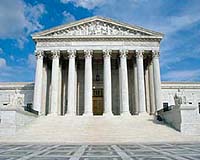| . |  |
. |
Colombo (AFP) June 29, 2010 The Maldivian cabinet resigned en masse Tuesday after a threat by the opposition to bring a vote of no confidence in parliament against every minister. The 13-member cabinet said it could no longer work with the opposition-controlled majlis, or parliament, the office of President Mohamed Nasheed said. It said the president will remain in office. "The majlis is preventing cabinet ministers from performing their legal obligations," Nasheed, 43, said in a statement. "Majlis members are behaving against the spirit and the letter of the constitution." Attorney general Husnu Suood said it was becoming difficult to govern the archipelago of 330,000 Sunni Muslims. "Every passing week, there is another attempt by opposition MPs to wrestle more control from the executive," Suood said. "They are making the country ungovernable." The opposition denied the allegation and accused the government of trying to sell off state assets under the guise of privatisation. "We have the numbers in parliament to block what is not good for the country," opposition spokesman Mohamed Shareef told AFP by telephone from the Maldivian capital Male. He said the government had arrested two key opposition leaders as part of a crackdown. "They are in breach of the constitution by arresting opposition law makers at a time when the majlis is in session," Shareef said. Nasheed's Maldivian Democratic Party (MDP) enjoys the support of a maximum of 32 law makers in the 77-member assembly, while the opposition Maldivian People's Party (DRP) has over 40 MPs. The president has no power to dissolve parliament and the opposition lacks the mandatory two thirds majority to impeach the president, who is also commander in chief of the armed forces. The opposition has resisted an ambitious privatisation programme proposed by Nasheed, who came to power in 2008 as the first democratically elected leader in the Indian Ocean atoll nation known for its upmarket tourism. "The cabinet was fed up," a government official said. "They could not make any headway with the parliament which was out to block them at every step of the way. They threatened to bring no confidence motions against every minister." He said a motion was to be taken up Wednesday against one of the ministers and the mass resignation had blocked the opposition move. Political sources said Nasheed could re-appoint the cabinet. The DRP of former president Maumoon Abdul Gayoom has remained the largest single party even though he lost to Nasheed in the 2008 elections. Nasheed's popularity at home has waned as he struggles to deliver the political and economic reforms he promised in the face of parliamentary resistance. Nasheed's profile abroad has soared, however, thanks to stunts aimed at attracting global attention to global warming and its impact on his low-lying archipelago which could be swamped by rising sea levels. In October last year, Nasheed and the government held a widely-publicised underwater cabinet meeting to highlight their plight ahead of the UN conference on climate change in Copenhagen. More than 80 percent of the country's land, composed of coral islands scattered about 850 kilometres (530 miles) across the equator, is less than one metre above mean sea level. The executive and the legislature in the Maldives are elected directly at two separate polls. Nasheed's term ends in October 2013 while the parliamentary session lasts until May 2014.
Share This Article With Planet Earth
Related Links Democracy in the 21st century at TerraDaily.com
 Obama view on judges questioned
Obama view on judges questionedWashington (UPI) Jun 28, 2010 U.S. President Barack Obama was the invisible nominee as the U.S. Senate began to consider Solicitor General Elena Kagan for the U.S. Supreme Court. "Whatever the president's motivation, his view of the role of judges is wrong," said Sen. John Kyl, R-Ariz., during Monday's confirmation hearings before the Senate Judiciary Committee. "Judges are to apply the law impartially, not take on ... read more |
|
| The content herein, unless otherwise known to be public domain, are Copyright 1995-2010 - SpaceDaily. AFP and UPI Wire Stories are copyright Agence France-Presse and United Press International. ESA Portal Reports are copyright European Space Agency. All NASA sourced material is public domain. Additional copyrights may apply in whole or part to other bona fide parties. Advertising does not imply endorsement,agreement or approval of any opinions, statements or information provided by SpaceDaily on any Web page published or hosted by SpaceDaily. Privacy Statement |